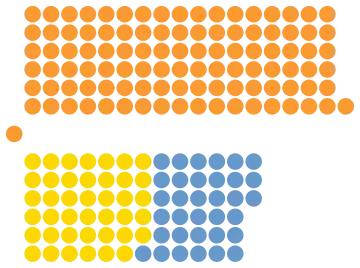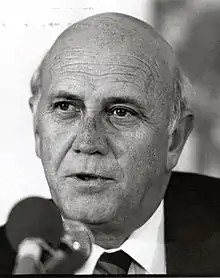1989 South African general election
General elections were held in South Africa on 6 September 1989, the last under apartheid. The elections were called early (no election was required until 1992) to gauge support for the recently elected head of the National Party (NP), F. W. de Klerk, who was in the process of replacing P. W. Botha as the country's president, and the new leader's program of reform to include further retreat from the policy of apartheid. The advent of the Conservative Party had realigned the NP as the moderate party, expected to initiate negotiations with the Black opposition, with the liberal opposition openly seeking a new settlement.
| |||||||||||||||||||||||||||||||||||||||||
All 166 elected seats in the House of Assembly All 80 elected seats in the House of Representatives All 40 elected seats in the House of Delegates | |||||||||||||||||||||||||||||||||||||||||
|---|---|---|---|---|---|---|---|---|---|---|---|---|---|---|---|---|---|---|---|---|---|---|---|---|---|---|---|---|---|---|---|---|---|---|---|---|---|---|---|---|---|
| Turnout | 69.5% | ||||||||||||||||||||||||||||||||||||||||
| |||||||||||||||||||||||||||||||||||||||||
 House of Assembly after the 1989 election | |||||||||||||||||||||||||||||||||||||||||
| |||||||||||||||||||||||||||||||||||||||||
 |
|---|
| This article is part of a series on the politics and government of South Africa |
|
|
Although it won an absolute majority, the National Party suffered an electoral setback and received only 48% of the popular vote, winning 94 of the 166 directly-elected seats in the House of Assembly. It was the first election since 1961 when it failed to win a majority of the (white) popular vote. However, the first-past-the-post voting system and a deeply fractured opposition allowed it to comfortably remain in power. Another 12 MPs were appointed by the State President and the 166 elected members, further entrenching the NP's majority.
The Conservative Party (CP), which opposed any form of power-sharing with other races, failed to accomplish a breakthrough but remained the official opposition with 39 seats. By some estimates, the party had received the backing of a slim majority of Afrikaner voters in parts of the country, once the NP's core constituency, but with very little support among English-speaking whites.[1]
Before the elections, the liberal Progressive Federal Party (PFP) had dissolved itself and regrouped as the Democratic Party (DP), winning 33 seats, six seats short of regaining its position as the official opoposition.
House of Assembly (White)
The White Chamber of Parliament had 178 members, 166 of whom were directly elected (including a seat from Walvis Bay, which was added in 1981) with 8 members indirectly elected by the directly elected members on the basis of proportional representation and 4 nominated by the State President (one from each province).[2]
The results of the election were interpreted by the government (based on support for the NP and the DP together) as a mandate from the white electorate to forsake the apartheid system and seek a compromise with the African National Congress and its leader Nelson Mandela.
Of the 12 appointed and indirectly-elected seats, nine were taken by the National Party, two by the Conservative Party and one by the Democratic Party.[3]
| Party | Votes | % | Seats | +/– | |
|---|---|---|---|---|---|
| National Party | 1,039,704 | 48.19 | 94 | −29 | |
| Conservative Party | 680,131 | 31.52 | 39 | +17 | |
| Democratic Party | 431,444 | 20.00 | 33 | +13 | |
| Herstigte Nasionale Party | 5,416 | 0.25 | 0 | 0 | |
| Independents | 898 | 0.04 | 0 | –1 | |
| Presidential appointees | 4 | 0 | |||
| Indirectly-elected members | 8 | 0 | |||
| Total | 2,157,593 | 100.00 | 178 | 0 | |
| Valid votes | 2,157,593 | 99.52 | |||
| Invalid/blank votes | 10,336 | 0.48 | |||
| Total votes | 2,167,929 | 100.00 | |||
| Registered voters/turnout | 3,120,104 | 69.48 | |||
| Source: Nohlen et al.[4] | |||||
House of Representatives (Coloured)
All five appointed and indirectly-elected seats were taken by the Labour Party.[2]
| Party | Votes | % | Seats | +/– | |
|---|---|---|---|---|---|
| Labour Party | 171,930 | 66.59 | 69 | –7 | |
| Democratic Reform Party | 39,741 | 15.39 | 5 | New | |
| United Democratic Party | 19,861 | 7.69 | 3 | New | |
| Freedom Party | 1,949 | 0.75 | 1 | 0 | |
| Independents | 24,705 | 9.57 | 2 | +1 | |
| Presidential appointees | 2 | New | |||
| Indirectly-elected members | 3 | New | |||
| Total | 258,186 | 100.00 | 85 | +5 | |
| Valid votes | 258,186 | 98.90 | |||
| Invalid/blank votes | 2,861 | 1.10 | |||
| Total votes | 261,047 | 100.00 | |||
| Registered voters/turnout | 1,439,112 | 18.14 | |||
| Source: Nohlen et al.[4] | |||||
House of Delegates (Indian)
Of the five appointed and indirectly-elected seats, three were taken by Solidarity, one by the National People’s Party and one by the Merit People's Party.[2]
| Party | Votes | % | Seats | +/– | |
|---|---|---|---|---|---|
| Solidarity | 58,216 | 38.02 | 16 | –1 | |
| National People's Party | 38,523 | 25.16 | 8 | –10 | |
| Democratic Party | 10,427 | 6.81 | 3 | New | |
| National Federal Party | 8,058 | 5.26 | 1 | +1 | |
| People's Party of South Africa | 6,064 | 3.96 | 1 | New | |
| United Party | 2,712 | 1.77 | 0 | New | |
| Merit People's Party | 2,078 | 1.36 | 3 | New | |
| Progressive Independent Party | 1,497 | 0.98 | 0 | –1 | |
| Freedom Party | 703 | 0.46 | 2 | New | |
| Republican Party | 701 | 0.46 | 0 | New | |
| Independents | 24,157 | 15.77 | 6 | +2 | |
| Presidential appointees | 2 | New | |||
| Indirectly-elected members | 3 | New | |||
| Total | 153,136 | 100.00 | 45 | 0 | |
| Valid votes | 153,136 | 99.10 | |||
| Invalid/blank votes | 1,388 | 0.90 | |||
| Total votes | 154,524 | 100.00 | |||
| Registered voters/turnout | 663,604 | 23.29 | |||
| Source: Nohlen et al.[4] | |||||
References
- The Star, 24 May 1987
- 1981 House of Assembly Election African Elections Database
- South Africa: Parliamentary Chamber: House of Assembly: Elections held in 1989 Inter-Parliamentary Union
- Dieter Nohlen, Michael Krennerich & Bernhard Thibaut (1999) Elections in Africa: A data handbook, pp832–837 ISBN 0-19-829645-2


